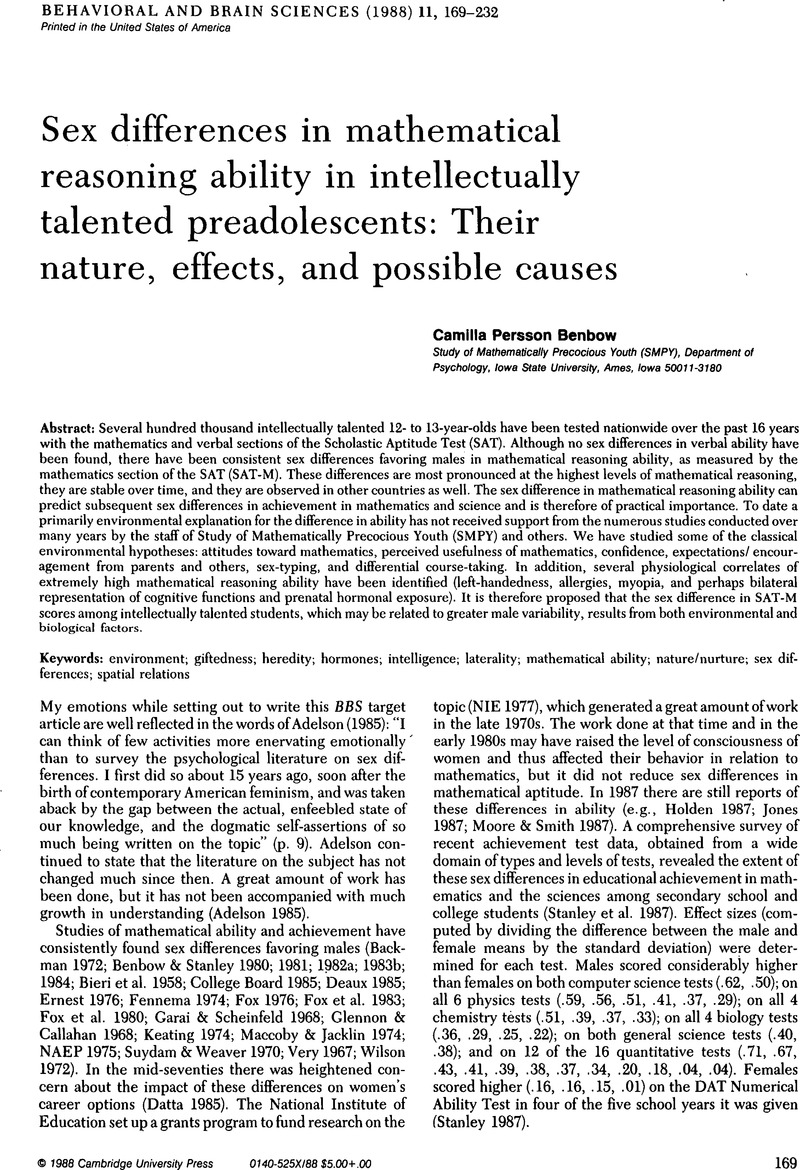Crossref Citations
This article has been cited by the following publications. This list is generated based on data provided by Crossref.
Rushton, J. Philippe
1990.
Sex, ethnicity, and hormones.
Behavioral and Brain Sciences,
Vol. 13,
Issue. 1,
p.
194.
Eliot, John
1990.
Spatial ability: Not enough space to make a sex difference.
Behavioral and Brain Sciences,
Vol. 13,
Issue. 1,
p.
196.
Petersen, Anne C.
Crockett, Lisa J.
and
Graber, Julia
1990.
Issues in the development of mathematical precocity.
Behavioral and Brain Sciences,
Vol. 13,
Issue. 1,
p.
192.
Borkowski, John G.
1990.
“Small” gender differences on the SAT: A scenario about social origins.
Behavioral and Brain Sciences,
Vol. 13,
Issue. 1,
p.
190.
Lubinski, David
and
Humphreys, Lloyd G.
1990.
A broadly based analysis of mathematical giftedness.
Intelligence,
Vol. 14,
Issue. 3,
p.
327.
Benbow, Camilla Persson
1990.
Sex differences in mathematical reasoning ability among the intellectually talented: Further thoughts.
Behavioral and Brain Sciences,
Vol. 13,
Issue. 1,
p.
196.
Bouchard, Thomas J.
and
Segal, Nancy L.
1990.
Advanced mathematical reasoning ability: A behavioral genetic perspective.
Behavioral and Brain Sciences,
Vol. 13,
Issue. 1,
p.
191.
Richardson, Ken
1990.
Go back to cognitive theory.
Behavioral and Brain Sciences,
Vol. 13,
Issue. 1,
p.
193.
Hoyenga, Katharine Blick
1990.
Some of the pathological assumptions in the sciences of gender.
Behavioral and Brain Sciences,
Vol. 13,
Issue. 1,
p.
194.
Boomsma, Dorret I.
1990.
Does every smart boy have a smart sister?.
Behavioral and Brain Sciences,
Vol. 13,
Issue. 1,
p.
192.
Feingold, Alan
1992.
Sex Differences in Variability in Intellectual Abilities: A New Look at an Old Controversy.
Review of Educational Research,
Vol. 62,
Issue. 1,
p.
61.
Hedges, Larry V.
and
Friedman, Lynn
1993.
Gender Differences in Variability in Intellectual Abilities: A Reanalysis of Feingold’s Results.
Review of Educational Research,
Vol. 63,
Issue. 1,
p.
94.
Thomas, Hoben
1993.
A theory explaining sex differences in high mathematical ability has been around for some time.
Behavioral and Brain Sciences,
Vol. 16,
Issue. 1,
p.
187.
Ma, Xin
1995.
Gender Differences in Mathematics Achievement Between Canadian and Asian Education Systems.
The Journal of Educational Research,
Vol. 89,
Issue. 2,
p.
118.
Hedges, Larry V.
and
Nowell, Amy
1995.
Sex Differences in Mental Test Scores, Variability, and Numbers of High-Scoring Individuals.
Science,
Vol. 269,
Issue. 5220,
p.
41.
Charness, Neil
and
Gerchak, Yigal
1996.
Participation Rates and Maximal Performance: A Log-Linear Explanation for Group Differences, Such as Russian and Male Dominance in Chess.
Psychological Science,
Vol. 7,
Issue. 1,
p.
46.
Wilder, Gita Z.
1997.
ANTECEDENTS OF GENDER DIFFERENCES*.
ETS Research Report Series,
Vol. 1997,
Issue. 1,
p.
1.
Reuterberg, Sven‐Eric
1998.
On Differential Selection in the Swedish Scholastic Aptitude Test.
Scandinavian Journal of Educational Research,
Vol. 42,
Issue. 1,
p.
81.
Butterworth, Brian
2006.
The Cambridge Handbook of Expertise and Expert Performance.
p.
553.
Voracek, Martin
Mohr, Elisabeth
and
Hagmann, Michael
2013.
ON THE IMPORTANCE OF TAIL RATIOS FOR PSYCHOLOGICAL SCIENCE1.
Psychological Reports,
p.
130729083742000.



